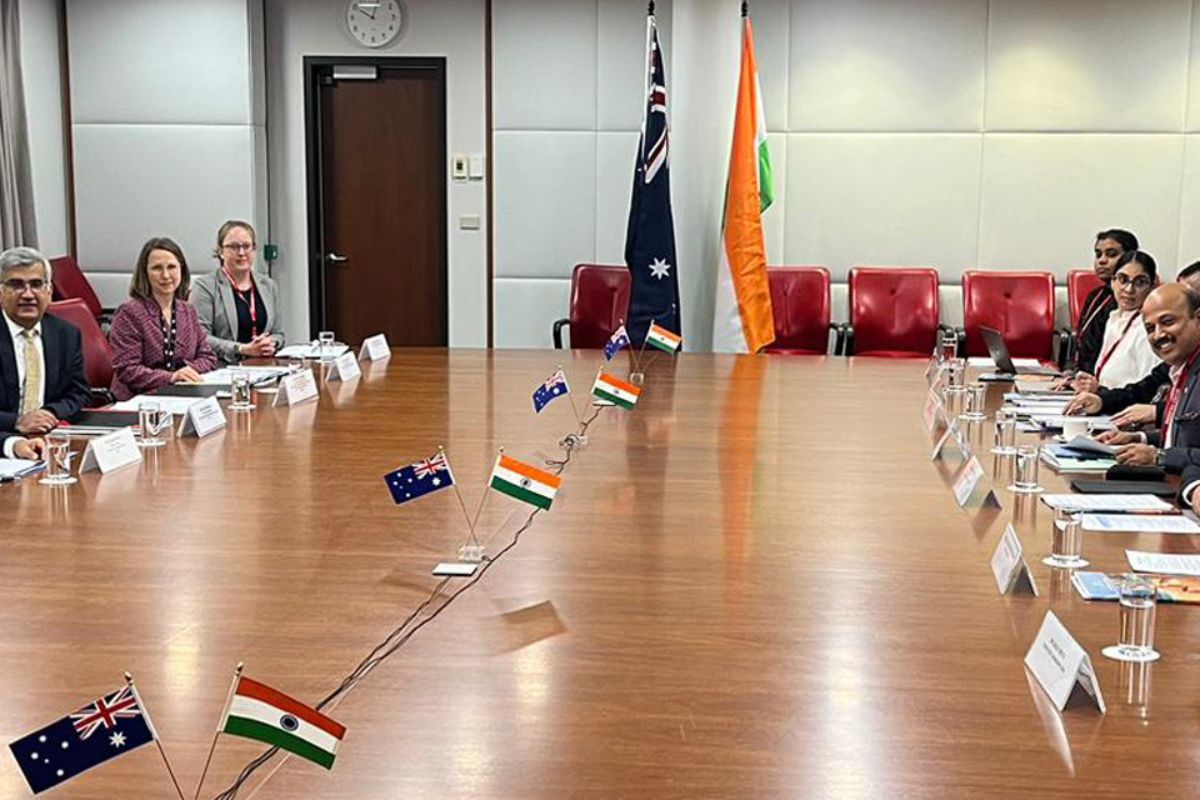India, Zimbabwe discuss cooperation in digital transformation solutions
At the third session of India-Zimbabwe Joint Trade Committee (JTC), both sides reviewed the bilateral trade and noted the vast potential that exists between the two countries.
A delegation led by Commerce Secretary Sunil Barthwal held the 11th India – New Zealand Joint Trade Committee (JTC) meeting in New Zealand, the Commerce & Industry Ministry said on Thursday.

Photo: A delegation led by Commerce Secretary Sunil Barthwal held the 11th India - New Zealand Joint Trade Committee (JTC) meeting in New Zealand, the Commerce & Industry Ministry said on Thursday. (credit: Official website of Ministry of Commerce and Industry)
India and New Zealand have acknowledged the existing huge potential in both economies and mutual trade complementarities, and that there is a substantial potential to increase the trade and people to people contacts.
A delegation led by Commerce Secretary Sunil Barthwal held the 11th India – New Zealand Joint Trade Committee (JTC) meeting in New Zealand, the Commerce & Industry Ministry said on Thursday.
The delegation also held a number of constructive and outcome-oriented meetings in New Zealand to work on ways to deepen the existing bilateral relations.
Advertisement
These meetings were held with the Minister for Trade of New Zealand Todd McClay, Acting Chief Executive and Secretary of Foreign Affairs and Trade of New Zealand, Brook Barrington.
These meetings had focused discussions on several key areas aimed at promoting bilateral trade and cooperation, marking a pivotal moment in strengthening economic ties and fostering collaboration between the two nations, building upon the existing close ties through people to people and business contacts, the Commerce Ministry said.
The meetings reviewed progress on market access issues, economic cooperation projects and explored opportunities for new initiatives. Both sides discussed the establishment of robust bilateral economic dialogue architecture and the creation of working groups on sectors like Agriculture; Food Processing, Storage & Transportation; Forestry and Pharmaceuticals to facilitate ongoing collaboration on key trade and economic issues.
Notably, discussions also included cooperation in the horticulture sector, including cooperation in kiwi fruit sector, quality & productivity, proper storage in pack houses and their suitable transportation, as well as the dairy sector.
The Commerce Ministry said once working groups were established, India and New Zealand will review the progress made by those working groups and the recommendations thereof at regular intervals.
The meetings, held on April 26-27, addressed bilateral trade matters of mutual interest, including issues related to market access, non-tariff barriers (NTBs), and sanitary and phytosanitary (SPS) measures on products like grapes, okra and mangoes, Mutual Recognition Arrangement (MRA) in Organic products, simplified homologation including through mutual recognition of comparable domestic standards for vehicles.
Both parties reaffirmed their commitment to resolve these issues through constructive dialogue and cooperation under the existing mechanism of JTC.
Services sector and enhancing its scale for bilateral trade was given special focus during the discussions held at various levels which revealed great interest from both sides for increasing business to business as well as people to people contacts and to work on the skill gaps and how the same can be strengthened through capacity building and improving the ease of mobility.
It touched upon areas such as the hospitality sector including adventure tourism, nursing, tele-medicine, education, air connectivity, Joint R&D (wherever feasible) and startups.
Collaboration in the pharmaceuticals and medical devices sector was discussed at length, including the adoption of fast tracking of regulatory processes and quality assessment of manufacturing facilities using, as appropriate, the inspection reports of comparable overseas regulators. Greater sourcing of medicines from India and cooperation in the medical device sector was also discussed.
Both parties briefly explored opportunities for collaboration in digital trade, meeting Nationally Determined Contributions, cross border payment systems, among others.
Discussions also encompassed co-operative engagement within platforms such as G20, Indo-Pacific Economic Framework for Prosperity (IPEF), and other plurilateral and multilateral associations and how to address imperative economic challenges and opportunities.
Both sides reaffirmed their commitment to the principles of the World Trade Organization (WTO) to uphold a rules-based international trading system.
Advertisement